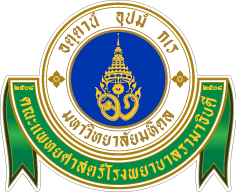Program Title:
Master of Nursing Science Program (International Program)
Name of the Degree:
Full name : Master of Nursing Science
Abbreviation : M.N.S
Responsible Unit:
Ramathibodi School of Nursing, Faculty of Medicine Ramathibodi Hospital, Mahidol University
Education Information:
Ramathibodi School of Nursing, was founded on July 27, 1965 as part of the Faculty of Medicine Ramathibodi Hospital, Mahidol University. Mahidol University is a public university in Bangkok, Thailand, and was ranked Thailand’s No. 1 University in 2018 by the Asia-Pacific region 2018.
Ramathibodi School of Nursing designed the curriculum based on the combination of education, research and service aspect of nursing to create a comprehensive and well-rounded learning experience. Courses are taught with an emphasis on clinical nursing practice and nursing research by highly qualified faculties with years of clinical experiences. Especially in the Master of Nursing Science Program (International Program), we combine the traditional classroom method of study with internet-based instruction which increase chance for the international students to join the program.
Ramathibodi School of Nursing is dedicated to people and health care development through teaching and research. It is also responsible for providing assistance to the regional, national as well as international communities. Ramathibodi School of Nursing is the leader of nursing education, research and academic activity in the Asian region and serves as a light to direct the nation’s health.
Advances in information and communication technology are constantly evolving in today’s world. People have easier access to technology for learning. As a result, the education system adapts to keep pace with diverse learning needs. Therefore, online learning has played a role at the higher education level in accordance with globalization and expanding opportunities for students and lead them to develop and achieve life-long learning in the changing world, especially the situation of pandemic of Coronavirus disease (COVID-19).
Ramathibodi School of Nursing, Faculty of Medicine Ramthibodi Hospital, Mahidol University realized the perspective changes of the situation. The program provides the Hybrid Education Model to better fit with student’s lifestyle and socioeconomic conditions today.
The Hybrid program in Master of Nursing Science (International Program) was established and launched in 2014. The Hybrid Education Model can be defined as a combination of tradition classroom (face-to-face) and Internet based instruction. The main objective of our hybrid program is to combine the most effective instructional aspects of the traditional classroom with the best features of online classes either synchronous or asynchronous communication. Therefore, “Hybrid Education Model” will be an alternative curriculum for higher nursing education.
Objectives:
After completing the curriculum, learners will be able to:
- Perform the roles of effective nursing scholars, leaders, clinicians, or nurse researchers with sympathy, morality, ethics and good attitudes.
- Perform nursing practices and research to improve the quality of nursing care in terms of health promotion, prevention, rehabilitation, and continuing care from hospital to community with variety of cultural considerations.
- Integrate knowledge of nursing science, evidence based practice, cultural diversity and related sciences to improve the quality of nursing care in their own countries.
- Effectively communicate and collaboratively work with clients, families, communities, and health care team.
The end program student learning outcomes of all program options are as follows:
1. Demonstrate professional and ethical behaviors consistent with practice, research, and academic work standards.
2. Utilize nursing knowledge, related disciplines, and evidence-based concepts to conduct research and provide holistic nursing care.
3. Have the ability to conduct research to improve the quality of nursing in the field of study and disseminate works in accordance with a standard.
4. Deliver patient-centered care that is safe, effective, and competent, while employing clinical decision-making skills in a culturally sensitive manner.
5. Create collaborative relationships with interdisciplinary team members, the patient, and the family to promote quality improvement initiatives for health outcomes.
6. Utilize innovative technology and information to communicate and facilitate decision-making to enhance nursing quality and risk management.
The role- specific outcomes of MNS in Master of Nursing Science (International Program) are as follows:
7. Develop the role-specific as a clinical nurse specialist with the following competencies:
7.1 Develop, manage, and organize the care system for a selected group or focused group of patients as program options (Adult and Gerontological Nursing, Pediatric Nursing, and Community Health Nursing in the circumstances.
7.2 Able to create nursing care in nursing practice to improve health care for a selected group (patients in the hospital or people in the community)
7.3 Able to utilize empirical evidence (Evidence-Based Practice), and research findings in nursing practice of selected groups of patients (e.g., Healthy, risk groups, acute/critical and chronic care across the life span in hospitals and communities) across cultures.
7.4 Outcome management and evaluation
Philosophy and importance of the curriculum
Master of Nursing Science Program (International Program) is an education management in response to the strategy of entering the ASEAN Community in terms of education, society, culture and health. Emphasis on education to understand health, illness and nursing in diverse cultures. It is a continuous learning experience with an emphasis on learning as an adult (Adult Learner) and continuous self-development (Life Long Learning). By using educational innovation (Hybrid Education Model), which is a teaching management that combines both classroom learning and online education by bringing together the strengths of each system to produce Master's degree with morality, ethics and professional ethics academic person with knowledge and abilities in nursing, leadership, and the ability to work with others.
They have skills in research studies and evidence-based practice in managing critical health problems and improving the quality of nursing care and health care systems; under the quality of nursing care and health care systems; under the modern teaching and learning system from a variety of teachers and learners from many countries using innovative digital media to exchange learning experiences with international colleagues.








